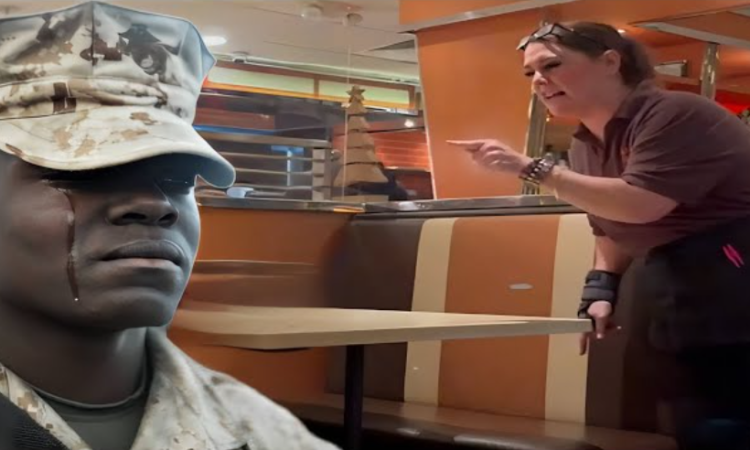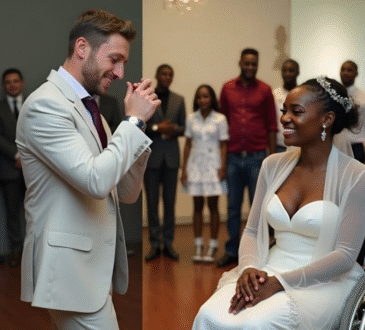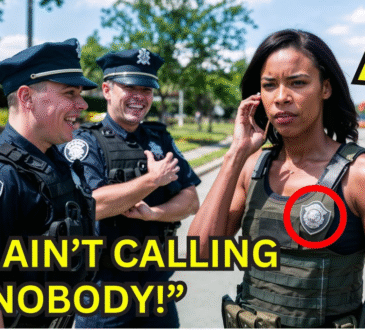
Marcus Jefferson had always found solace at his favorite local diner. It was a place of comfort and familiarity, where the staff knew his name and he was treated with the respect he deserved. The aromas of freshly brewed coffee and sizzling bacon were a soothing balm after his long, demanding deployments.
However, upon returning from a particularly grueling deployment, he discovered that the management and staff had changed. The new faces behind the counter and in the kitchen were unfamiliar and, as he would soon find out, unwelcoming. The diner, now under new management, had a different atmosphere. Marcus noticed the subtle changes immediately: the cold stares, the hushed whispers, and the unwelcoming glances. The warm, inviting environment he had once cherished felt stark and hostile.
Ignoring his unease, he stood in line, eagerly anticipating the meal he had missed so much while serving overseas. When it was finally his turn, Marcus smiled warmly at the young waitress behind the counter and placed his order. The response was a curt, “We’re out of that.” Surprised, Marcus politely requested an alternative, only to receive the same dismissive reply. The waitress’s tone was icy, and the disdain in her eyes was unmistakable. Each interaction felt like a deliberate attempt to undermine his dignity, a stark contrast to the friendly service he once knew.
Feeling his patience wearing thin, Marcus asked to speak with the manager. A middle-aged woman emerged from the back, her demeanor equally hostile. She questioned why Marcus was causing a scene and accused him of holding up the line. Her words were laced with condescension, making it clear that she had no intention of addressing his concerns.
The air grew thick with tension as the situation escalated. The manager and a cook who had joined the conversation openly admitted that they did not serve “people like him” and demanded that he leave immediately. The humiliation stung deeply, and Marcus felt a mix of anger and sadness as he exited the diner, the staff’s mocking laughter echoing behind him.
The betrayal he felt was profound. A place that once felt like home had turned against him, not because of his actions, but because of his skin color. That night, Marcus reflected on the events. The blatant racism he had encountered was a stark reminder of the prejudices that still existed, even in places he considered safe. Determined to handle the situation with dignity and strength, he decided to return to the diner the next day, but this time he would not go alone. He contacted his Marine unit, and they agreed to join him, all dressed in their full uniforms.
The next morning, Marcus and his unit donned their crisp, decorated uniforms and made their way to the diner. The early sun glinted off their medals and insignias, a powerful symbol of their service and sacrifice. As they entered, the atmosphere shifted dramatically. The patrons and staff turned to look at them, their expressions ranging from curiosity to shock. The same waitress from the previous day paled visibly when she recognized Marcus and the formidable presence of his unit.
Marcus approached the counter with a calm but authoritative demeanor, flanked by his fellow Marines. The sight of the uniformed men was a stark contrast to the diner’s usual clientele. He asked to see the manager, and this time his request was met with immediate compliance. The head manager, a kind and respectful woman who had not been present the previous day, came out to address him. Marcus recounted the events of the day before, detailing the discriminatory treatment he had received from the staff.
Unbeknownst to Marcus, a TikToker in the restaurant had been filming the entire interaction. The TikToker captured the powerful image of Marcus and his unit standing tall in their uniforms, demanding justice and respect. The video was posted online and quickly went viral, sparking outrage and calls for accountability from people all around the world. Comments poured in, condemning the diner’s staff and praising Marcus and his unit for their dignified response.
As the video gained traction, it reached the restaurant owner. Appalled by what he saw, the owner decided to take immediate action. He personally visited the diner to apologize to Marcus face-to-face. The owner, visibly shaken by the situation, expressed his deep regret for the behavior of the new staff and assured Marcus that such actions were not representative of the restaurant’s values. He promised to rehire the old staff and to implement strict policies to ensure such discrimination would never happen again.
Marcus listened quietly, his face a mask of calm resolve. The owner’s apology was heartfelt, and Marcus could see the sincerity in his eyes. The owner’s commitment to making things right gave Marcus a glimmer of hope. The diner, which had been a symbol of comfort and belonging, could once again become a place where he felt welcomed and respected. As the owner addressed the remaining patrons and staff, Marcus and his unit stood by, their presence a powerful reminder of the strength and dignity they embodied. The confrontation had turned into a teachable moment for everyone present.
The new staff members who had participated in the discrimination were swiftly dismissed, their actions serving as a warning to others. The owner of the diner, deeply disturbed by the incident, took immediate and decisive action. He began by firing the staff members involved in the discriminatory behavior. Their actions had tarnished the reputation of his establishment, and he knew that swift measures were necessary to restore trust. Next, he issued a public apology, acknowledging the hurt caused and expressing his commitment to rectifying the situation. This apology resonated with many, as it was clear and heartfelt.
In an effort to repair the damage, the owner reached out to the previous staff members, those who had helped build the diner’s reputation as a welcoming and friendly place. He offered them their jobs back, along with higher salaries, as a gesture of appreciation for their dedication and professionalism. The old staff, who had always treated customers with respect, were glad to return, bringing with them the warmth and familiarity that the diner had lost under the new management.
The community rallied around Marcus Jefferson, praising the courage and dignity with which he handled the situation. His actions had not only highlighted a significant issue but also provided a path forward for addressing it. The TikTok video of Marcus and his unit confronting the discriminatory staff continued to circulate widely. It became a powerful symbol of the fight against racism and discrimination, resonating with people from all walks of life. Support for Marcus poured in from across the globe, with social media platforms flooded with messages of solidarity and condemnation of the diner’s previous staff.
The incident sparked a broader conversation about equality and respect, prompting many to reflect on their own behaviors and the systemic issues that allowed such discrimination to occur. This dialogue led to positive changes within the community, with various businesses and organizations pledging to implement more inclusive practices.
In the days that followed, the diner faced significant backlash. Customers boycotted the establishment, and it received negative reviews online. However, this adversity became a catalyst for change. The owner implemented new training programs focused on diversity and inclusion, ensuring that all staff members understood the importance of treating every customer with respect. These programs were designed to foster a culture of inclusivity and to prevent such incidents from happening again.
The transformation of the diner was profound. What had once been a place marred by discrimination became a beacon of unity and acceptance. Marcus’s actions had sparked a movement for change, and the community, inspired by his strength and dignity, came together to support him. They worked collectively to ensure that no one else would face such discrimination.
Marcus continued his service as a Marine, his resolve strengthened by the experience. He understood that the fight against prejudice was ongoing, and he was determined to stand up for what was right, both in uniform and as a member of his community. Marcus’s story became a powerful testament to the impact one individual can have in the face of injustice. His decision to confront the discrimination with dignity and strength resonated deeply with many, inspiring others to stand up against prejudice in their own lives.
The diner, once a place of exclusion, transformed into a welcoming establishment that celebrated diversity. The staff, many of whom were the old employees who had been rehired, greeted Marcus warmly when he returned, now a celebrated hero and advocate for equality. Years later, Marcus visited the diner, reflecting on how much had changed.
The owner, who had worked tirelessly to make amends, expressed his gratitude for Marcus’s patience and perseverance. He thanked Marcus for giving the restaurant a second chance to prove its values. The atmosphere in the diner was one of warmth and camaraderie, a stark contrast to the hostility Marcus had faced before.
Marcus’s legacy lived on, a reminder that even in the face of adversity, it is possible to affect change through resilience and integrity. His story continued to inspire future generations, teaching them the importance of standing up for what is right and treating every individual with the respect they deserve. The diner, now a symbol of transformation and hope, served as a lasting tribute to the power of unity and the courage of those who fight for justice.




